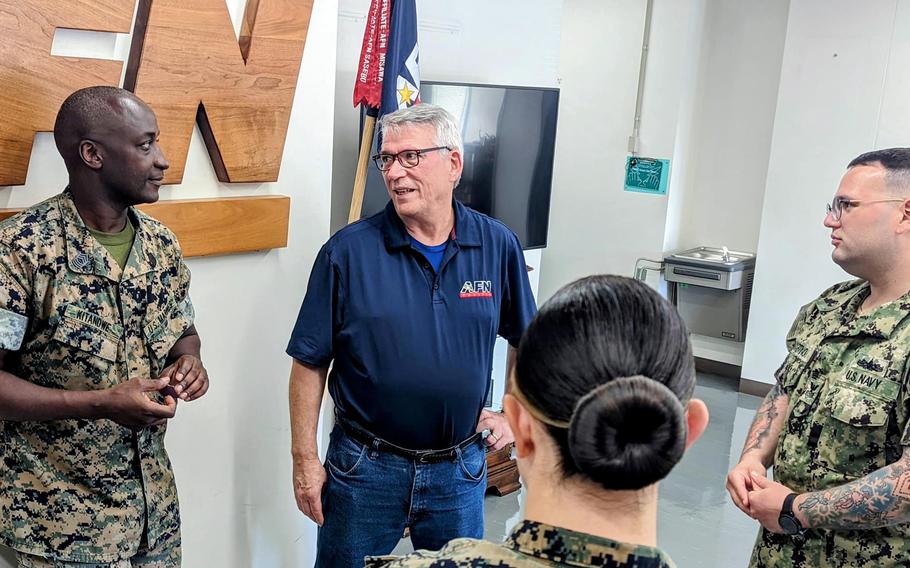
Robert Hawthorne, chief of the American Forces Network Pacific technical services division, died Thursday, Feb. 23, 2023, after suffering a heart attack at Yokota Air Base, Japan. (AFN)
YOKOTA AIR BASE, Japan — Robert Hawthorne, chief of the American Forces Network Pacific technical services division, died Thursday at this base in western Tokyo after suffering a heart attack, according to a Facebook post by the network Saturday.
His wife, Kim Hawthorne, in a message posted Sunday to the Yokota Civilian Medical Forum Facebook group, said her husband died at the Urgent Care Clinic.
She blamed the clinic’s inability to provide lifesaving treatment in serious health emergencies and a lack of guaranteed care at Japanese medical facilities for U.S. military personnel for contributing to her husband’s death.
“The Yokota [Urgent Care Clinic] has no capacity to treat any life altering events,” she wrote in her post. “It matters not whether you are [active duty] or civilian — BOTH are at extreme risk.”
Robert Hawthorne began his career as an airman and continued serving as a civilian leader long after retiring from military service, according to the AFN post.
“Rob was an incredible leader with a storied career in the Department of Defense, serving for 40 years across the Defense Media Activity, American Forces Network, Defense Information Systems Agency, the Air Force Broadcasting Service, Air Force Television, and the Air Force New Agency,” the post said.
He had a talent for keeping AFN stations broadcasting and networked around the world, it added.
“But what we’ll remember most is how he treated people; he was a wonderful mentor and team builder, and his legacy lives on through those he trained and developed through the years,” AFN said. “We grieve the loss of a true professional, family man, and friend. Our thoughts and prayers are with his family and the many co-workers who knew Rob.”
Kim Hawthorne’s concerns echoed earlier complaints by Cathy Hakun, whose husband, Andrew Hakun, 52, a Department of Defense civilian employee, died in February 2021 after a long, agonizing wait for surgery following a heart attack at home on Yokota.
After Hakun arrived at the urgent care clinic by ambulance, calls were placed to more than 10 nearby hospitals before finding one in Hachioji, 7 miles from Yokota, that would accept him, according to his medical records.
U.S. military personnel in Japan “are living in a country with excellent health care service if you can get to it,” his widow said Jan. 27. “Anybody on that base who has to go through urgent care is running an unsurvivable risk.”
The Defense Health Agency, under a congressional mandate, imposed limits effective Jan. 1 on Department of Defense civilian employees’ access to most health care at military bases in the Indo-Pacific region. Urgent care and some other services, such as labor and delivery and exams for employment and sports, are still available, but most health care at military hospitals in the region is reserved for beneficiaries of Tricare Prime, the top tier of the military health care plan.
The director of DHA’s Indo-Pacific region, Army Maj. Gen. Joseph Heck, in October advised DOD civilians in Japan to look for health care providers in the communities around U.S. military bases.
Kim Hawthorne, in her Facebook post, said staff at Yokota’s urgent care clinic are not trained for emergencies.
“My husband had no chronic illnesses nor did he have any cardiac history,” she wrote. “What we experienced at the [urgent care clinic] was devastating.”
She declined in a Facebook message Monday to Stars and Stripes to describe her husband’s experience at the base clinic.
A Yokota spokesman, Air Force 1st Lt. Danny Rangel, in an email Monday, said officials are working on a response to questions sent by Stars and Stripes about the death.
Health care advocate Randi Wilson, a DOD analyst at Yokota who was inspired to create the Yokota Civilian Medical Forum after the deaths of two coworkers in February 2021, said U.S. personnel in Japan have likely been dying from lack of care for decades.
The forum has identified a dozen such cases over the past two years, she said by phone Monday.
U.S. military leaders in Japan are concerned that support for active-duty troops may suffer if civilian personnel don’t want to work in Japan due to inadequate medical care, Wilson said.
Military needs to provide access to primary care for civilians and establish a medical facility certified to provide trauma care for all personnel in Japan, she said.
“We rely completely on Japanese facilities and Japanese facilities can deny care at any time, legally,” she said.